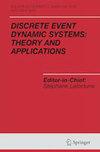Navigating the 'Darkness': Feminist, Trans, and Queer Comedy Against Ideology
IF 1.6
4区 计算机科学
Q4 AUTOMATION & CONTROL SYSTEMS
Discrete Event Dynamic Systems-Theory and Applications
Pub Date : 2022-10-01
DOI:10.1353/tae.2022.0047
引用次数: 0
Abstract
Abstract:In this article I argue that dark comedy is an important democratic resource for challenging ideology. I build this argument by drawing from two voices—trans YouTube activist Natalie Wynn and feminist science fiction writer Joanna Russ. I begin by conducting a close reading of Wynn's video "The Darkness," in which she discusses the hypocrisies of free speech ideology. Critically responding to a transphobic performance by comedian Ricky Gervais, Wynn shows how the language of political correctness and free speech are used to conceal deeper structures of oppression. To think about this problem, I look at Joanna Russ's satirical "How to Suppress Women's Writing," a mock instruction manual for preventing women and people of color from becoming published authors. In this text, Russ theorizes ideology as an organized and escalating progression of responses to anti-hegemonic action. Russ's use of satire to expose these uses of ideology, however, has the effect of undermining their political projects. Drawing insight from this example, I conclude by returning to Wynn's case for the importance of comedy created by marginalized people (she terms this type of comedy "the darkness") as a political tool. While some leftist responses have tended to argue that the medium and structure of comedy facilitates bigotry and erasure, Wynn makes a case for dark comedy as a means of transcending these structures. She shows that dark comedy is an antidote to dominant ideologies, and is a political tool that is more readily available to the oppressed than to their oppressors.导航“黑暗”:女权主义者、跨性别者和反对意识形态的酷儿喜剧
摘要:本文认为,黑色喜剧是挑战意识形态的重要民主资源。我通过引用两个声音——跨性别YouTube活动家娜塔莉·韦恩和女权主义科幻作家乔安娜·拉斯——来建立这个论点。我首先仔细阅读了韦恩的视频《黑暗》(The Darkness),她在视频中讨论了言论自由意识形态的虚伪。韦恩对喜剧演员瑞奇·热维斯(Ricky Gervais)的反变性表演进行了批判性的回应,他展示了政治正确和言论自由的语言是如何被用来掩盖更深层次的压迫结构的。为了思考这个问题,我看了乔安娜·拉斯(Joanna Russ)的讽刺作品《如何抑制女性写作》(How To Suppress Women’s Writing),这是一本模拟的指导手册,旨在阻止女性和有色人种成为出版作家。在本文中,Russ将意识形态理论化为对反霸权行动的反应的有组织的和不断升级的进展。然而,俄罗斯用讽刺来揭露意识形态的这些用途,却破坏了他们的政治计划。从这个例子中得出结论,我回到Wynn的案例,即边缘化人群创作的喜剧(她称之为“黑暗”)作为政治工具的重要性。虽然一些左翼人士倾向于认为,喜剧的媒介和结构助长了偏见和抹除,但韦恩认为,黑色喜剧是一种超越这些结构的手段。她表明,黑色喜剧是主流意识形态的解毒剂,是被压迫者比压迫者更容易获得的政治工具。
本文章由计算机程序翻译,如有差异,请以英文原文为准。
求助全文
约1分钟内获得全文
求助全文
来源期刊
CiteScore
3.90
自引率
5.00%
发文量
13
审稿时长
>12 weeks
期刊介绍:
The research on discrete event dynamic systems (DEDSs) is multi-disciplinary in nature and its development has been dynamic. Examples of DEDSs include manufacturing plants, communication networks, computer systems, management information databases, logistics systems, command-control-communication systems, robotics, and other man-made operational systems. The state processes of such systems cannot be described by differential equations in general. The aim of this journal, Discrete Event Dynamic Systems: Theory and Applications, is to publish high-quality, peer-reviewed papers on the modeling and control of, and all other aspects related to, DEDSs. In particular, the journal publishes papers dealing with general theories and methodologies of DEDSs and their applications to any particular subject, including hybrid systems, as well as papers discussing practical problems from which some generally applicable DEDS theories or methodologies can be formulated; The scope of this journal is defined by its emphasis on discrete events and the dynamic nature of the systems and on their modeling, control and optimization.

 求助内容:
求助内容: 应助结果提醒方式:
应助结果提醒方式:


